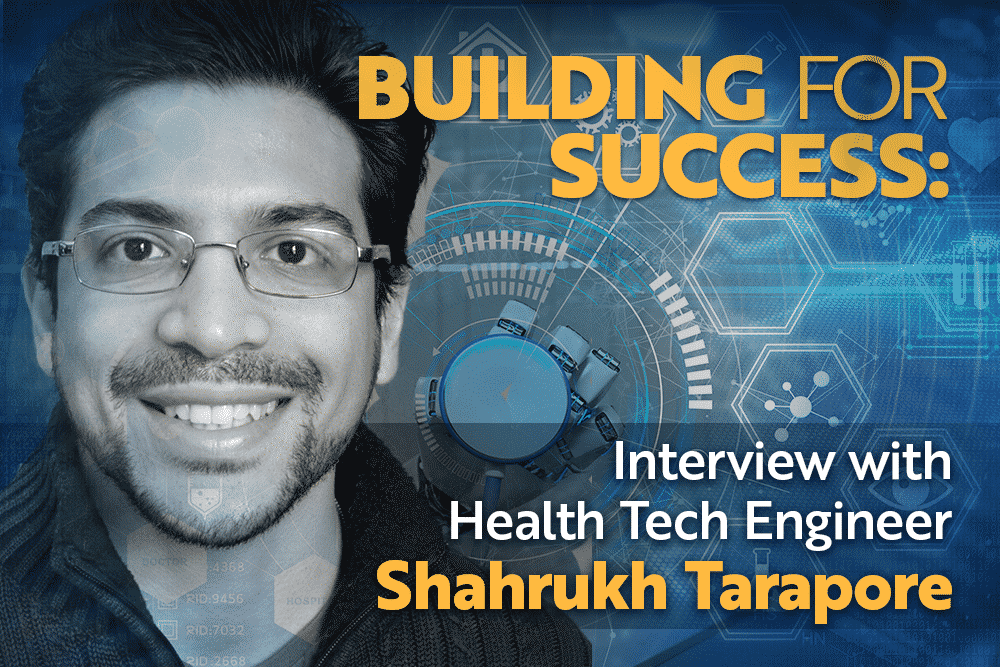Shahrukh Tarapore is a leading figure in health tech development currently working as the Head of Engineering at Arcweb Technologies. MedTech sat down with Mr. Tarapore to discuss how companies can best navigate the ever-evolving digital health landscape.
You currently work as the Head of Engineering for Arcweb Technologies–a technology firm focused on designing and developing applications and services for the finance and healthcare industry. Can you share your background in healthcare technology? How has that background shaped your current role?
Arcweb is a strategic design and development consulting firm. Our clients include health care systems, payers, innovation groups, and tech startups. We touch upon the entire spectrum of technological maturation: from concept to market, as well as the spectrum of company maturation: from small startups to large enterprises.
As the head of engineering, I lead a team of approximately 20 engineers with a wide range of experience. My responsibility is twofold: 1. I provide executive-level leadership and guidance to our customers who are trying to gain an understanding of what is going on in the healthcare industry. 2. I manage my team to ensure that we are maintaining market place relevance and Arcweb is continuously innovating.
With an extensive background in advising health tech companies, what are some of the most common issues you have witnessed within the design and development of digital health technologies?
Interoperability is the single biggest issue. The business of healthcare is one of the most complex industries we have within society. It’s getting better: there’s growing innovation in healthcare and regulation-but we are still a long way off. A big problem that is often overlooked is the need to put patients first. Medical technology is predominantly created, not for patients, but for insurers and providers. For a long time, healthcare has in effect happened to patients. Patients are, in large part, passive participants of healthcare and that has shaped how a lot of health care technology has been created. Shifting that paradigm to one where patient empowerment is a goal will, in turn, affect providers and their tooling.
I don’t think that there is anyone that doesn’t want patients to be empowered, but once you bring that empowerment to the forefront of the conversation, the more we realize that a lot of physicians are not yet equipped to handle the changes.
While a growing number of healthcare leaders, government officials, and digital health experts have been vocal about the importance of building interoperable health care technologies, many companies still fail to fulfill this growing demand. With a widely accepted standard yet to be implemented, what steps can digital health companies take to build for healthcare integration?
Realistically, I’d say that there is going to be a lot of churn in the next 3-5 years. There is a lot of demand from consumers, government, and others. I’m on the fence as to whether a single standard will ever be realized. I think it is important for companies to accept that there may never be a single standard to match. I don’t think that it is a hopeless situation though. There are a lot of players coming in that do not have traditional healthcare backgrounds. Normally that would be a cause for concern, because this means that they do not have the relevant experiences to makes sure that their technology is applicable to the domain they are attempting to operate in. However, the side effect is that these players question a lot of the status quo that exists in the healthcare space. What I have noticed is that this often means that they are forcing the adoption of generalized technological standards, as opposed to what has been done in the past in healthcare: going off in isolation and creating your own standards that have no direct applicability to a generalized standard.
We are a web-driven society. Adopting tried and true standards that are generally applicable to the entire technology landscape is only beneficial to the healthcare industry, as it creates interoperability by design. As the adoption of this mindset increases, I believe it will become easier to integrate with various systems, even if there isn’t one single standard.
You work with a broad range of clients at Arcweb. What strategies do you offer mid to early-stage tech startups looking to develop and market strong digital health technologies? What are the common challenges you prepare health tech companies to navigate?
I believe the number one thing is that a lot of startups fail to realize and effectively execute a plan that recognizes that there are a lot of different players in the decision-making process in regards to making a buying decision in healthcare. When a hospital system or payer considers purchasing a technology system, there are many different people and departments that are integral in that decision. It is imperative to build relationships, not just with the one person who is ultimately making that buying decision, but with the many people who support that process. That can be anyone from the director of IT who has to actually set the system up, the security officer who ensures the system is compliant with healthcare policy, the business office, an innovation team, and so on.
What I have seen with companies that fail or stumble in the selling process, is that they have not fully attempted to understand and address the many facets and levels of the organization which they are trying to sell to. What I tell clients is that there are many people who are part of a buying decision, and most of them can say no, but only a couple can say yes. It is very important to include all of those players in the process so that those who can say only say no are not inclined to, and those that can say yes are enabled to do so because their peers are not telling them no. There is a very unique dance that has to be played. Strategizing about how to do that is a key part of selling healthcare technology.
Big picture question: having worked with a wide array of digital health companies, how would you say technology is influencing healthcare? What areas of digital health need significant improvement?
The digital footprint that we are leaving now is incredible compared to two years ago–that is analogous to the data being captured in the healthcare space. For a long time, a lot of that data was owned by the provider. But now that that data is being produced by patients themselves and tech companies–there are so many more players that are involved in health data. That is going to create a lot of new complexities that we haven’t thought about yet. I truly think about it as the Wild West.
I think we need improvement in how we define privacy, and how we ensure that data is being compartmentalized in appropriate ways. I think data is too raw of a form to make decisions off of without measured analytics. Out of context, data can be a very dangerous thing. If you’re going to be making health care decisions based on data, you should understand the circumstances through which it was collected and have the means to properly interpret it.
Which may likely mean the increased use of AI.
Absolutely. With the amount of data that we are producing, it is going to be intractable for humans to cull through that and make any sense of it. Algorithms will also increasingly play a role in determining patterns and reading large amounts of data.
In recent years, the FDA and other governmental organizations have implemented new and updated regulations and guidelines concerning the health tech industry–such as the software pre-cert pilot program and the private payer program. How, if at all, have these changes influenced your work? What new regulations do you expect in the coming years?
It certainly has. The pre-cert program is one of the first major regulations that has truly treated software as a device. I think it’s good that software has become a part of the conversation. This allows us to work from a framework as to how software will be used by healthcare players, but it also introduces more hurdles. Software can develop at a much faster pace than hardware technologies, so it definitely reins in this fast-moving sub-industry. That may be necessary, because it is too easy for software to go too far and possibly cause harm. I think these programs are an acknowledgment from the government that technology outruns the pace of the government’s ability to regulate.
In terms of regulation, there certainly will be increased policies. HIPAA covers information between providers and payers. Current health laws don’t really cover the scope of personal health data–generated individually. As of right now, there is no framework that really provides guidance on how to best protect data.
What particular aspect of digital health are you most looking forward to seeing develop in the coming years?
Seeing patients become an equal partner throughout the healthcare process. I think this will drive competition and improve outcomes. I believe that the best outcomes will be driven by patients that are empowered to make decisions alongside their providers.





